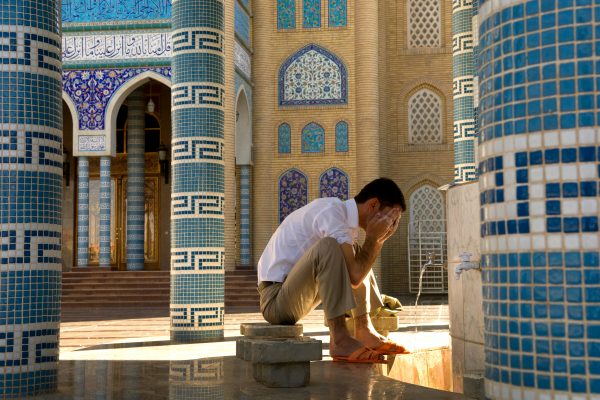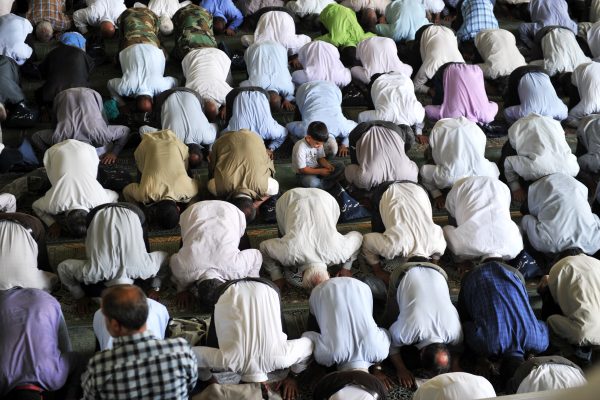Today is the funeral of Queen Elizabeth. Over the last weeks, some would argue a portion of Muslims have over-venerated her. So, what should our stance be on monarchies? We look to the Holy Quran for some answers.
Today is the funeral of Queen Elizabeth. Over the last weeks, some would argue a portion of Muslims have over-venerated her. So, what should our stance be on monarchies? We look to the Holy Quran for some answers.
On 8th September 2022, Queen Elizabeth II of the UK breathed her last. The reaction from individual Muslims and Muslim organisations were mixed. On the one hand, many Muslims distanced themselves from paying any sort of respect or condolences to the late Queen, citing her (implicit) participation in colonial Britain. In fact, they (and non-Muslims) used her death as a golden opportunity to highlight this terrible past.
On the other hand, there was a totally opposite reaction by another set of Muslims. Some called the Queen a “role model”, others asked God to “bless the Queen”, and one mosque even went as far as playing the UK’s national anthem inside its building. This group of Muslims received considerable backlash from the first group. Some of these groups later deleted these social media messages whilst others sternly stood by them, disabling comments and denying the opportunity for people of their own community the right to voice their opinion.
A third group has chosen to remain silent and continue with their lives as if nothing has happened.
It’s fair to say Muslims are confused about how to react to the Queen’s death. Naturally, we turn to the Quran to help us understand what our stance and views should be. When most of us think about royal families, we automatically think of them in a negative light. Royal families are seen as people who hoard wealth, deprive citizens and implement oppressive policies. In the world today, we have many Muslim and non-Muslim royal families, so what should be our view on them? Should we treat Muslim royal families different from non-Muslim royal families?
The Quran adopts the view that monarchies generally cause havoc. The Queen of Sheba (Bilqis) mentions the following upon learning about Sulayman (as) and his kingdom:
Indeed, when kings invade a land, they ruin it and debase its nobles. They really do so!”
[27:34]
How does one become a king? By invading the land and subjugating its people, at least in the experience of Bilqis.
We can’t deny that Islam is deeply rooted in monarchism. After the first four caliphs, the caliphate adopted a monarchist model, whereby one caliph would hand the authority to his son. So, if monarchies are bad by default, what should be said about monarchies in Islam?
There are a number of questions to unpack. In this article, we’ll investigate some Quranic verses that deal with either royal families or individual kings/queens in the following way:
- Bad kings in the Quran.
- Good kings in the Quran.
- Queens in the Quran.
- Prophets who became kings
- Remembering to Whom authority ultimately belongs.
Bad Kings in the Quran
One evil king in the Quran is Nimrod, the nemesis of Prophet Ibrahim (as). Nimrod had in his control the entire Babylon kingdom. He ordered Ibrahim to be burned alive when Ibrahim challenged the authority of the idol gods they worshipped. Only to be saved by Allah (SWT):
But We said, ‘Fire, be cool and safe for Abraham.”
[21:69]
Nimrod, much like some leaders of today, denied people their freedom to speak up and share their voices. He had no interest in listening to his citizens if it was against his opinions or policies.
Nimrod becomes so arrogant he challenges Prophet Ibrahim, citing he can do anything that God can do.
[Prophet], have you not thought about the man who disputed with Abraham about his Lord, because God had given him power to rule? When Abraham said, ‘It is my Lord who gives life and death,’ he said, ‘I too give life and death.’ So Abraham said, ‘God brings the sun from the east; so bring it from the west.’ The disbeliever was dumbfounded: God does not guide those who do evil.[2:258]
Interestingly, Allah (SWT) appoints Ibrahim the ‘power to rule’ i.e. kingship.
Ibrahim challenges Nimrod to two things. The first is to give life and death. According to one tafsir, Nimrod proves he can give life and death by freeing prisoners who were given the death sentence. Nimrod argues it is he who can give death (by sentencing people to death) and give life (by revoking the death sentence). Ibrahim then asks Nimrod to change the course of the sun, which is where the latter is left speechless.
Nimrod is a prime example of a corrupt king.
But we all know a king who is worse than Nimrod: Pharoah. Pharoah goes a step further and calls himself god:
I am your lord, the most high!”
[79:24]
Pharoah is so arrogant that he tries to meet God:
Pharaoh declared, “O chiefs! I know of no other god for you but myself. So bake bricks out of clay for me, O Hamân, and build a high tower so I may look at the God of Moses, although I am sure he is a liar.”
[28:38]
In the story of Musa (as) and Pharaoh, we learn about the latter’s atrocities. An interesting point to note is not everyone in Pharoah’s royal family was evil. His wife, Asiya, is considered one of the four greatest women in history. Aside from being a monotheist, she is generally a virtuous and pious lady who raises Musa and ultimately meets martyrdom when her real beliefs became known to Pharaoh. This illustrates that not all members of a royal family should be seen in a negative light. Each individual should be judged on their own actions.
The last evil king in the Quran is not mentioned by name. This is a man who would have stolen a boat were it not for Khidr damaging it just enough to not attract the king’s attention:
The boat belonged to some needy people who made their living from the sea and I damaged it because I knew that coming after them was a king who was seizing every [serviceable] boat by force.
[18:79]
Good Kings in the Quran
One of the two good kings mentioned in the Quran is a non-Muslim. He is the king of Egypt and husband to Zulekha. When this king has the dream of the seven fat cows being eaten by seven skinny ones, he seeks its interpretation:
And ˹one day˺ the King said, “I dreamt of seven fat cows eaten up by seven skinny ones; and seven green years of grain and ˹seven˺ others dry. O chiefs! Tell me the meaning of my dream if you can interpret dreams.
[12:43]
The chiefs are unable to provide an interpretation. The royal family enlist the help of Prophet Yusuf (as), who explains how seven years of economic prosperity will be followed by seven years of drought. The king acts on Yusuf’s advice and appoints Yusuf as an economic/financial minister. Yusuf is tasked to be efficient with the seven prosperous years to combat the crisis that is to follow.
Here is an example of a king who cares about the welfare of his subjects and makes decisions to ensure their safety. The king is so rich that it is highly doubtful that any drought would affect him. He could hoard what remains for himself. But he acts sensibly and with wisdom.
The second good king mentioned in the Quran is King Saul, who was appointed by a Prophet to lead the Children of Israel after Musa. Tafsir suggests it was Prophet Samuel:
Have you not seen those chiefs of the Children of Israel after Moses? They said to one of their prophets, “Appoint for us a king, ˹and˺ we will fight in the cause of Allah.” He said, “Are you not going to cower if ordered to fight?” They replied, “How could we refuse to fight in the cause of Allah, while we were driven out of our homes and ˹separated from˺ our children?” “Allah has appointed Saul1 to be your king.” They protested, “How can he be our king when some of us are more deserving of kingship than he, and he has not been blessed with vast riches?” He replied, “Allah has chosen him over you and blessed him with knowledge and stature. Allah grants kingship to whoever He wills. And Allah is All-Bountiful, All-Knowing.
[2:246-247]
Through Prophet Samuel (as), Allah (SWT) appoints King Saul over the Children of Israel, although they proceed to reject him because he isn’t as wealthy as them. This shows a king isn’t necessarily someone who has all the wealth, but Allah (SWT) chooses a king based on his character and merits.
Queens in the Quran
The sole queen referenced in the Quran is the Queen of Sheba. Here is a jinns description of Sheba upon reporting back to Sulayman:
I found a woman ruling over the people, who has been given a share of everything- she has a magnificent throne [but] I found that she and her people worshipped the sun instead of God. Satan has made their deeds seem alluring to them, and diverted them from the right path: they cannot find the right path.”
The Queen of Sheba wasn’t a bad person, but she and her people were misguided into polytheism. Later she reverts to Islam.
Prophets who Became Kings
The following Prophets became kings, appointed by Allah (SWT) either directly or indirectly (through the cause and effect law of the world).
- Prophet Ibrahim, as mentioned above.
- Prophet Yusuf eventually becomes the king of Egypt.
- Prophet Dawud was a king who handed kingship to Prophet Sulayman as it was the will of God
The instances of Prophets becoming kings illustrates that being royalty doesn’t automatically make someone bad. There is no objection if the king and royal family use their material wealth as a means to further the cause of God, and if they’re not Muslims (like in the case of the king of Egypt), look after their subjects and rule justly.
Real Authority Belongs to Allah (SWT)
What we must keep in mind and what the Prophets were very cognizant of is real authority belongs only to God. He may lend his authority to Prophets and even non-Prophets for a temporary period of time, yet he is the Ultimate King:
Say, ˹O Prophet,˺ “O Allah! Lord over all authorities! You give authority to whoever You please and remove it from who You please; You honour whoever You please and disgrace who You please—all good is in Your Hands. Surely You ˹alone˺ are Most Capable of everything.”[3:26]
A royal family isn’t necessarily bad in and of itself. They should be judged according to their actions, like any other human. A member of the royal family does not deserve respect because they’re rich and powerful. Rather respect is earned based on the type of life they lived. And Queen Elizabeth’s life and legacy should be reflected upon using the same scales.










